Gerald R. Ford: A Steady Hand in a Time of Crisis
Gerald R. Ford became president under extraordinary circumstances. He was never elected to the presidency or vice presidency, yet he took office during one of the most dangerous constitutional crises in U.S. history. Coming out of the Watergate scandal and the collapse of public trust, Ford saw his main duty as healing the nation. His administration was brief, lasting from 1974 to 1977, but his influence on the presidency, constitutional governance, and post-Watergate recovery was significant. Ford brought honesty, humility, and stability to a broken system.
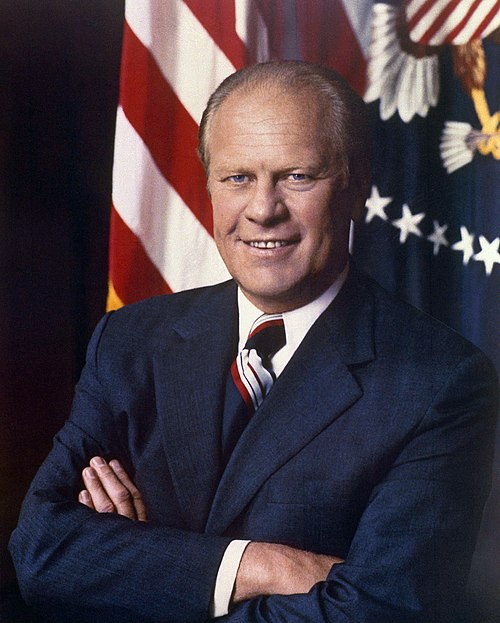
Early Life and Background
Gerald Ford was born Leslie Lynch King Jr. on July 14, 1913, in Omaha, Nebraska. His parents separated just weeks after his birth due to his father’s abuse. His mother, Dorothy Gardner, moved to Grand Rapids, Michigan, where she later married Gerald Rudolff Ford, a paint salesman. Young Leslie took his stepfather’s name and was raised as Gerald Rudolph Ford Jr., although his name was not legally changed until he was 22.
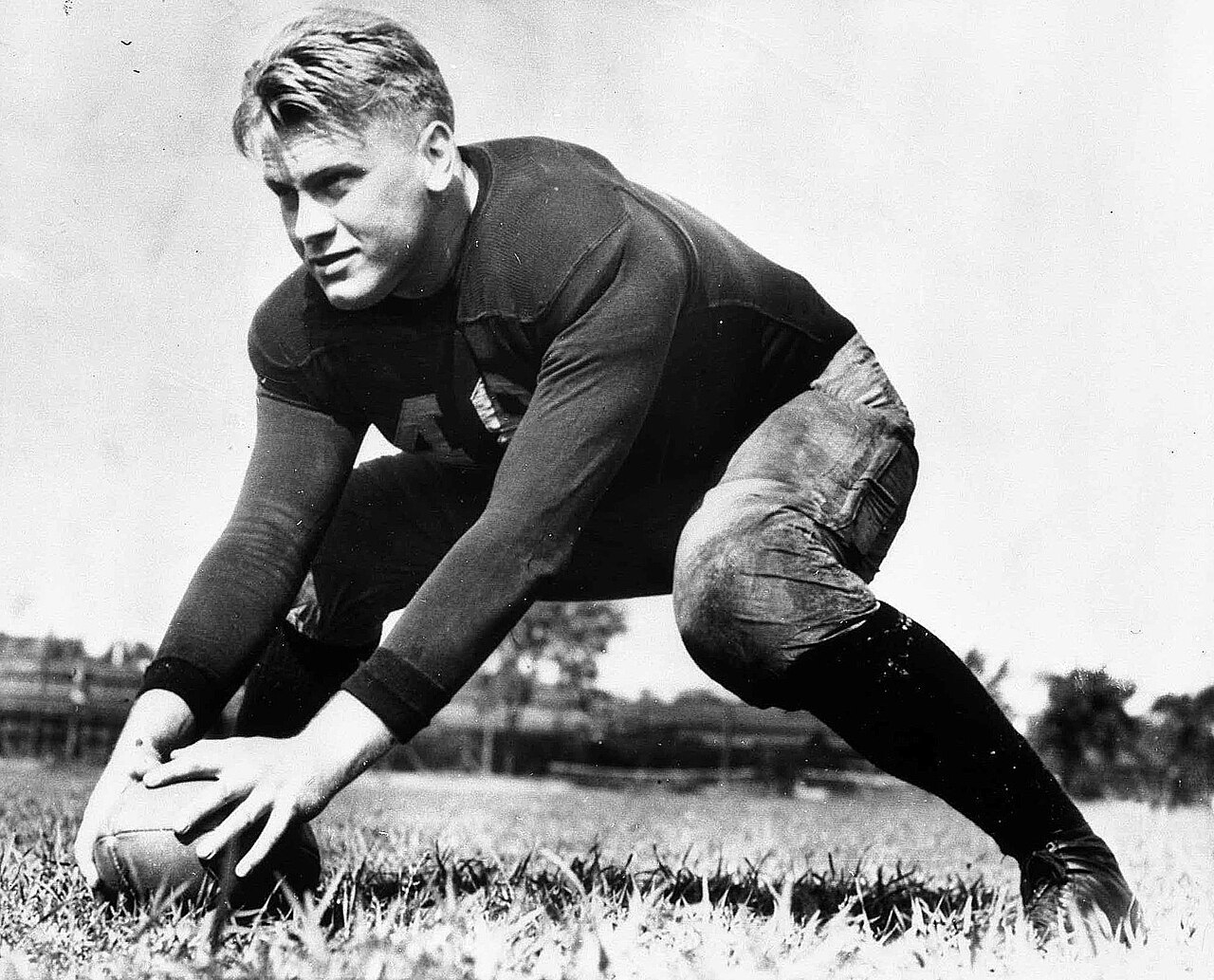
Ford attended South High School in Grand Rapids, where he excelled academically and athletically. He earned a scholarship to the University of Michigan, where he became a star center and linebacker on the football team. He was part of the 1932 and 1933 national championship teams and was named team MVP in 1934. He received contract offers from the Detroit Lions and Green Bay Packers, but turned them down to pursue a career in law and public service.
Ford enrolled at Yale Law School in 1938 and graduated in 1941 in the top third of his class. After the attack on Pearl Harbor, Ford enlisted in the U.S. Navy. He served as a lieutenant commander in the Pacific Theater, primarily aboard the USS Monterey, an aircraft carrier that participated in major battles, including the Battle of Leyte Gulf. He was nearly killed during a typhoon that caused fires and severe damage to the ship in 1944.
Political Rise and Congressional Career (1949–1973)
After returning home, Ford entered politics and was elected to the U.S. House of Representatives in 1948 from Michigan’s 5th District. He would serve in the House for the next 25 years. Though considered a moderate Republican, Ford leaned conservative on fiscal matters but was progressive on civil rights, voting in favor of the Civil Rights Acts of 1964 and 1968, the Voting Rights Act of 1965, and other major reforms.
In 1965, Ford became House Minority Leader. He was considered loyal, pragmatic, and effective at maintaining party unity. He worked closely with Senate Republicans and the Johnson and Nixon administrations, which opposed the size of Great Society programs, despite their support for other policies. Ford was not known for being a brilliant orator, but he was respected for his work ethic, discipline, and integrity. Despite multiple Republican efforts, he was never able to gain a majority in the House.
Relationship with Nixon
Though a Nixon supporter, Ford maintained some independence. When the Watergate scandal began to unfold in 1973, Ford initially defended Nixon but gradually came to accept that the cover-up was real. His honest reputation was key to Nixon’s decision to nominate him as vice president after Spiro Agnew resigned in disgrace.
The First Unelected Vice President
Agnew’s resignation in October 1973 due to tax evasion opened a constitutional test. Nixon invoked the 25th Amendment, nominating Ford as vice president. Ford was confirmed quickly by overwhelming bipartisan votes—92–3 in the Senate and 387–35 in the House. His confirmation marked the first use of the amendment’s succession clause.
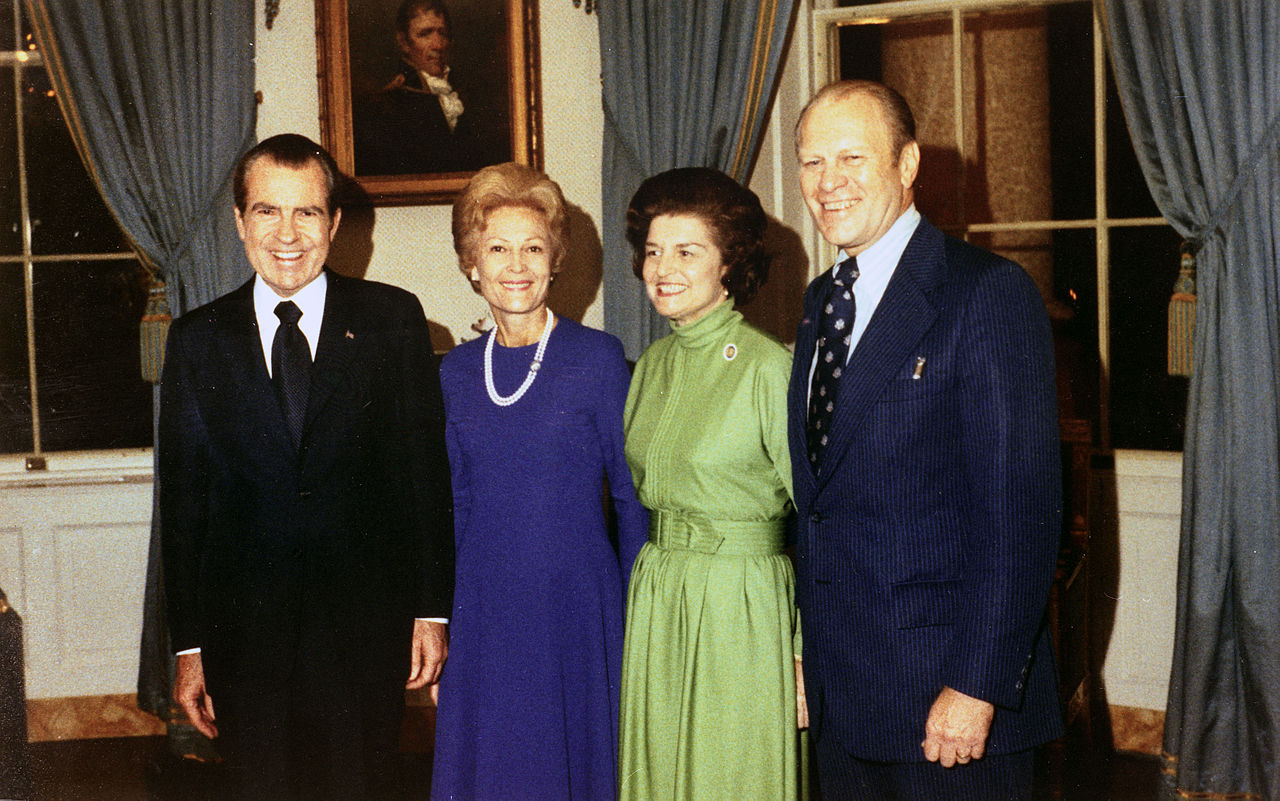
Position During Watergate
As vice president, Ford was largely sidelined from major policy decisions but remained a trusted public figure. As Nixon’s legal problems worsened, Ford prepared for the possibility that he might assume the presidency. Still, he avoided any public disloyalty.
The Accidental Presidency (1974–1977)
On August 9, 1974, after Nixon resigned under pressure of near-certain impeachment, Ford took the oath of office. In his first address, he declared, “Our long national nightmare is over.” It was a powerful message aimed at calming a country weary of scandal and deception.
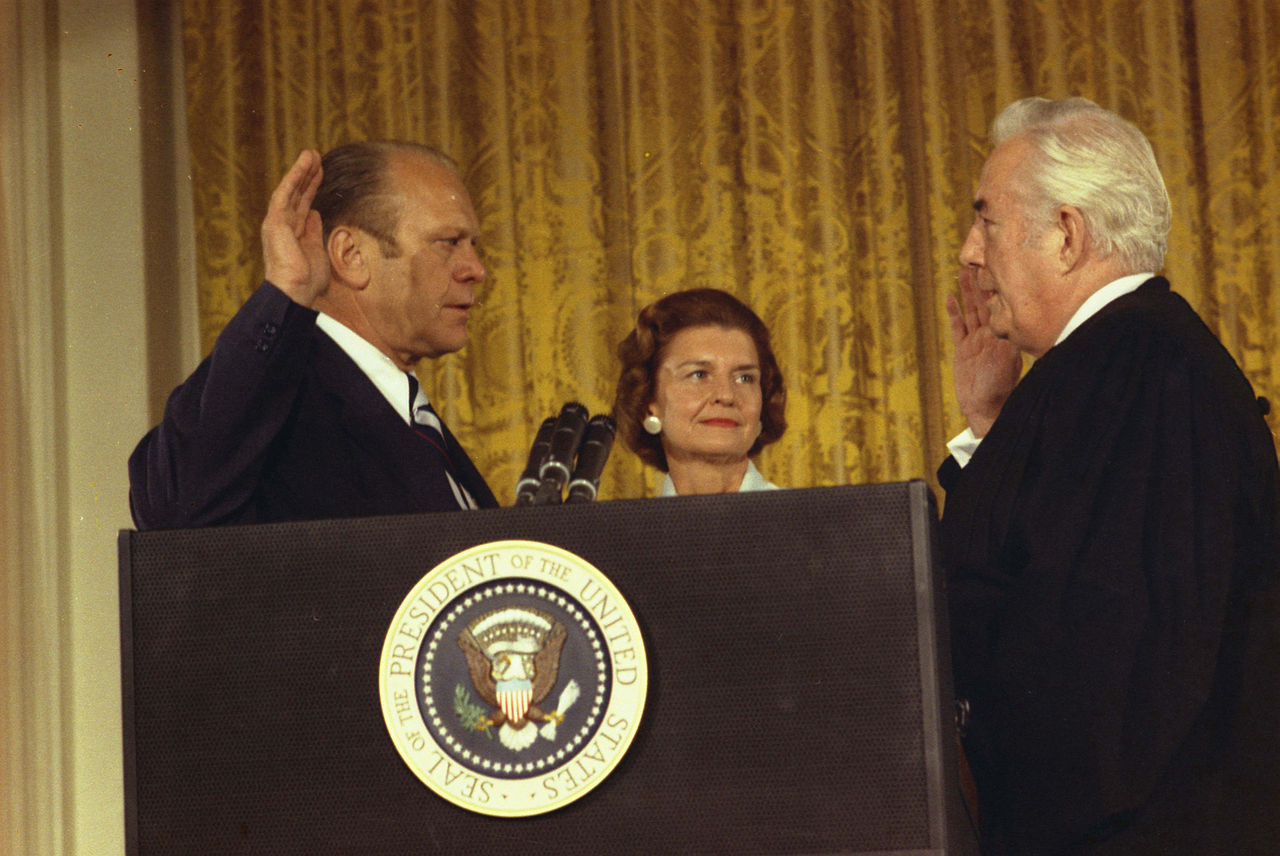
The Nixon Pardon
Just one month into his term, Ford made the most controversial decision of his presidency: a full and unconditional pardon for Richard Nixon. Ford explained it was necessary to spare the country a long, painful trial. He believed a pardon would allow Americans to focus on urgent economic and foreign policy issues. The backlash was intense. Critics called it a secret deal. His approval ratings dropped from 71% to below 50% within a single day. Many historians now view the pardon as an act of political courage that likely cost Ford re-election.
Domestic Challenges
Ford inherited a struggling economy. Inflation was high, unemployment was rising, and the country faced a recession. His “Whip Inflation Now” campaign, symbolized by red WIN buttons, encouraged voluntary price controls and personal frugality. It failed to curb inflation and became a political punchline.
He vetoed 66 bills during his presidency, mostly related to federal spending. Congress overrode 12 of those vetoes—a reflection of Ford’s weak political standing and the Democratic control of both chambers.
Foreign Policy and the End of Vietnam
Ford continued many of Nixon’s foreign policy strategies. His administration focused on détente with the Soviet Union and maintaining U.S. alliances. But the most dramatic event came in 1975, when North Vietnamese forces overran Saigon. Ford ordered the evacuation of U.S. personnel and South Vietnamese allies. Though chaotic, the operation rescued over 7,000 people.
In 1975, he also survived two assassination attempts—both by women connected to radical movements—within three weeks of each other.
1976 Election and Political Defeat
Ford faced a strong primary challenge from California Governor Ronald Reagan, who accused him of being too moderate and too soft on the Soviet Union. The primary was bitter and nearly deadlocked. Ford narrowly secured the nomination at the Republican convention in Kansas City.
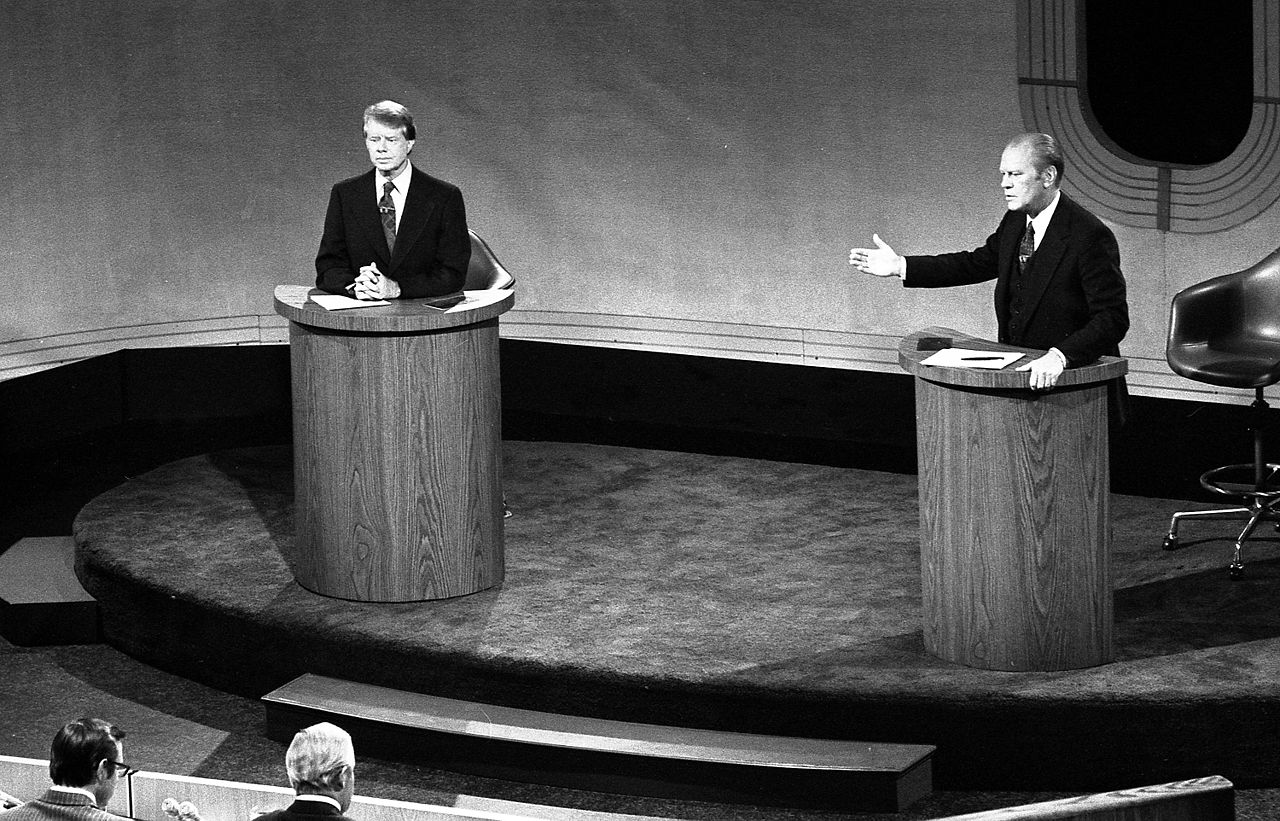
In the general election, Ford ran against Democrat Jimmy Carter, a little-known governor from Georgia. Ford recovered ground through debates and strong campaigning, but a blunder in one of the televised debates—claiming Poland was not under Soviet domination—hurt his credibility. Carter narrowly won the election, 297 to 240 in the Electoral College, and 50.1% to 48% in the popular vote.
Post-Presidency and Public Service
After leaving office, Ford settled in Rancho Mirage, California. He stayed active through speeches, writing, and public appearances. He served on the boards of several companies and received numerous honors. Over time, public opinion of Ford softened, especially after the Nixon pardon was re-evaluated in light of his efforts to protect the presidency and constitutional stability.
Ford and Jimmy Carter developed a close friendship in later years, often appearing together at public events. In 2001, President Bill Clinton awarded him the Presidential Medal of Freedom, calling him “a true profile in courage.”
Death and Legacy
Gerald Ford died on December 26, 2006, at the age of 93. He lay in state at the U.S. Capitol—the first former president to do so since Ronald Reagan. In eulogies, leaders from both parties praised his humility, fairness, and courage.
Ford’s presidency was brief and controversial, yet it brought stability. He brought credibility back to the White House after Watergate. Though not known for sweeping achievements, he believed in public service, constitutional order, and personal decency. He often said, “I’m a Ford, not a Lincoln”—a modest statement that underscored his approach to leadership: careful, honest, and grounded in democratic norms.
His legacy is that of a transitional leader who put the country’s needs above his own. In a moment when democracy was tested, Gerald Ford helped hold it together.

